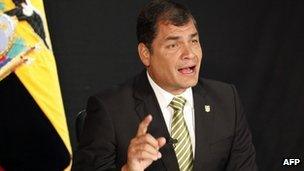Julian Assange row: Americas give Ecuador partial support
- Published

Foreign ministers from the American continent have passed a motion backing the "inviolability of diplomatic missions" amid the row between the UK and Ecuador over Julian Assange.
The Wikileaks founder is in Ecuador's London embassy fighting extradition to Sweden over sexual assault claims.
Ecuador called for the Organisation of American States vote saying the UK had threatened to storm the embassy.
But the resolution was reworded after the UK insisted it had made no threat.
The BBC's Kim Ghattas said the resolution expressed solidarity with Ecuador but, despite a strong plea from Ecuador's foreign minister, Ricardo Patino, there was no reference to any threat against his country's embassy in London.
The United States withdrew its opposition to the resolution after the text was amended.
Australian Mr Assange, 41 - whose Wikileaks website has published a mass of leaked diplomatic cables embarrassing countries including the US - has been fighting extradition to Sweden saying he fears he will then be passed on to authorities in US.
In May the UK Supreme Court dismissed Mr Assange's bid to reopen his appeal against extradition and gave him a two-week grace period - during which he entered Ecuador's embassy - before extradition proceedings could start.
The South American country announced it had granted Mr Assange asylum on 16 August saying his human rights could be violated if he is sent to Sweden to be questioned over allegations that he sexually assaulted two Wikileaks supporters in Stockholm in 2010.
But the UK has said it will not allow him safe passage out of the country and has said it will follow its obligations, under the Extradition Act, to arrest Mr Assange if he leaves the embassy.
The meeting of the OAS, which represents 35 states in the Caribbean and North and South America, was called by Ecuador after it received a letter from the UK last week.
Ecuador said the letter, which drew attention to the Diplomatic and Consular Premises Act 1987 which would potentially allow the UK to lift the embassy's diplomatic status to allow police to enter the building, was a "threat".
The Foreign Office later said the letter had been sent to clarify "all aspects of British law that Ecuador should be aware of".
During the meeting in Washington DC, Mr Patino had called on the UK to withdraw its threat and guarantee it would not storm the diplomatic mission.
The UK, which has observer status at the OAS, insisted no threat was ever made and the UK remained committed to honouring international law.
The representative of the Dominican Republic had questioned why the meeting was called since the row over Mr Assange was not going to be solved there, especially not with any grandstanding by Ecuador.
Trade impact
Prof Victor Bulmer Thomas, former director of the Chatham House think tank, said the UK government could not afford "to get into any scraps" with Latin American countries, with whom it wants to build better trade links.
"Of course no one's going to cancel a contract and give it to a French company just because of this, but it's all these fine margins. When companies are arguing about whether to give a contract to a French, British or German company, it's those sort of issues that will come up in the next few months," he said.
Earlier this week Ecuador's President Rafael Correa told the BBC the diplomatic row over Mr Assange "could be ended tomorrow" if Britain gave him safe passage to Ecuador.
But Mr Correa said without that, the situation could go on for years.
The US is carrying out an investigation into Wikileaks, which has published a mass of leaked diplomatic cables, embarrassing several governments and international businesses.
In 2010, two female Wikileaks supporters accused Mr Assange of committing sexual offences against them while he was in Stockholm to give a lecture.
He claims the sex was consensual and the allegations are politically motivated. He says he fears onward extradition to the US if extradited to Sweden because of his website's publication of confidential documents.
- Published24 August 2012
- Published21 August 2012
- Published21 August 2012
- Published20 August 2012
- Published20 August 2012
- Published20 August 2012
- Published20 August 2012
- Published23 September 2020
- Published16 August 2012
- Published18 August 2012
- Published2 May 2012